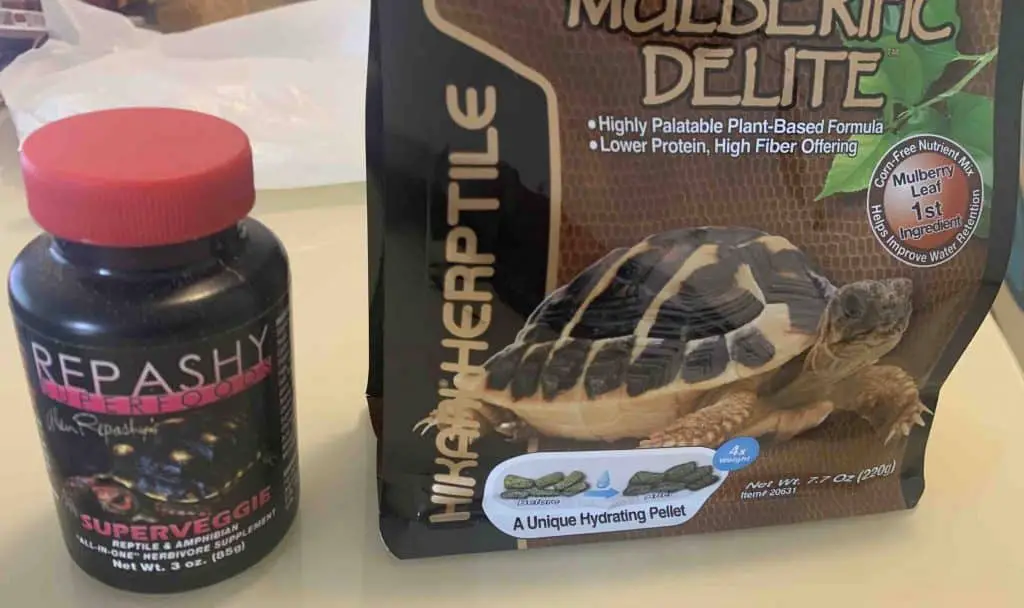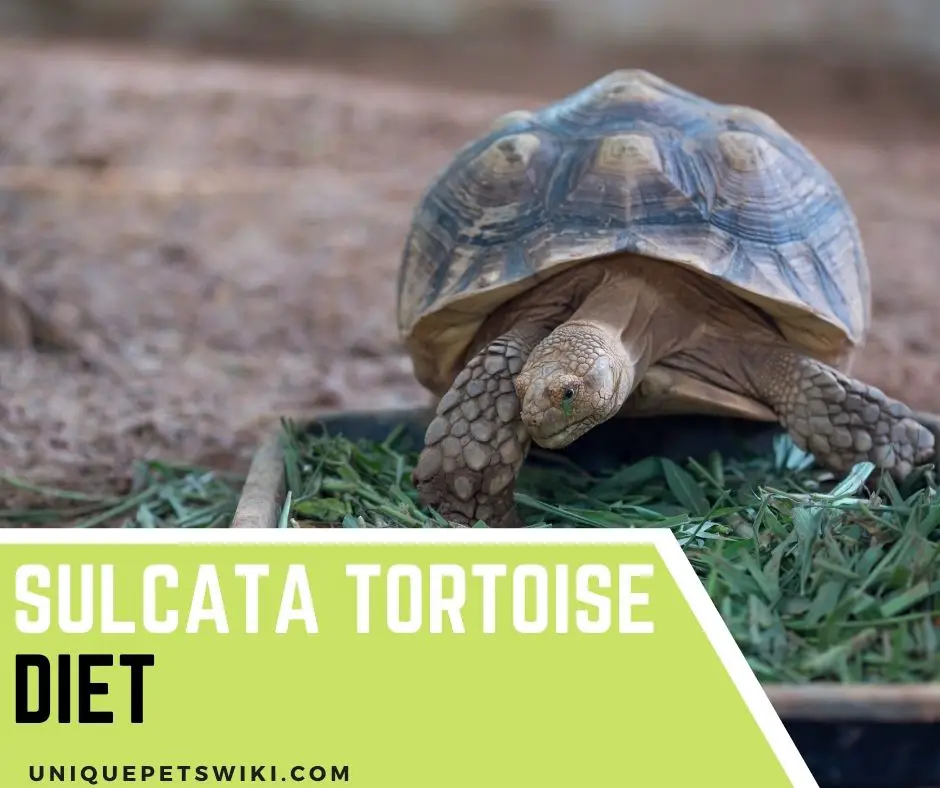Sulcata tortoises, also called African spurred tortoises, are tortoise species that originate from Sub-Saharan Africa. They are a large tortoise species and are considered the world’s largest continental turtle species. As a responsible owner, you may wonder what a suitable diet for your sulcata is.
In the wild, sulcata tortoises live in a semi-arid environment, and dry grasses and weeds are their only food. This shows you must provide them with a high-fiber, grass-based diet to help them grow healthy and happy.
In this article, we will break down everything you need to know about sulcata tortoise diet, from the best diet suitable for them to how often you can feed your tortoise.
Contents
Common Dietary Problems With Sulcata Tortoises
Here are some of the common dietary problems that you can encounter when you are feeding your tortoise.
- Providing too much protein
- Overfeeding your tortoise
- Not feeding them with enough fiber
- Feeding them with fruit or other sugary foods regularly
- Not providing your tortoise with enough calcium
Sulcata Tortoise Diet
Sulcata tortoises are herbivorous animals and need a diet high in fiber and calcium but low in protein. Furthermore, the most important food in sulcata diet is grass along with freshwater. Similar to cows, they are grazers, and they enjoy walking all day and munching lazily on grass.
One thing about sulcata tortoises is that they can feed on most grasses growing in the yards. You can just cut the grass and give it to them in the summer. However, if you live in places where the grass stops growing during the winter, you can opt for orchard or timothy hay.
You can buy them from pet stores, farm supply stores, large department stores, and online.
Grasses And Hay

You will need to provide access for your sulcata tortoises to graze on grasses and hay. Furthermore, most of your tortoise diet should comprise pesticide and herbicide-free grass, clover, cheatgrass, shrubs, and edible flowers.
You need to avoid feeding sulcata tortoises with alfalfa hay because it has high oxalates, leading to stone formation in the bladder, kidney failure, and then reducing their lifespan. However, you can feed them with grass hays like meadow grass, orchard grass, timothy hay, and oat hay.
Greens And Vegetables
You can also offer your tortoise with leafy greens. However, it is suggested that around 40% of the vegetable diet should comprise mustard, collard greens, kale, and dandelion greens. Furthermore, you should avoid feeding your tortoise with greens high in oxalates like spinach, collard greens, parsley, rhubarb, etc.
Some of the other vegetables you can include in your tortoise diet are grated raw carrots, sweet potatoes, winter squash, broccoli, sweet potatoes, kale, dandelions, romaine, etc. However, this should only be around 20% of the veggie diet that you give your tortoises.
Furthermore, you should only feed kale and broccoli 1-5% of the time.
Fruits
You should only feed sulcata tortoise with fruits only as a treat. This is because they are high in sugar and water contents which sulcata don’t usually get in the wild. Some fruits you can give your sulcata are strawberries, berries, apricots, organically grown bananas with skin, apples, pears, etc.

Supplementation Food
You need to provide your sulcata tortoise with a rich in calcium diet to help them grow healthy bones and shells. Sulcata tortoise originates from a semi-arid region with calcium-rich soils, and they get sufficient calcium from roots, bone pieces, soil, and snail shells.
You can provide your pet sulcata with calcium through calcium supplements or cuttlefish bones. When giving them calcium supplements, ensure you give them 2-3 times per week and ensure it does not have vitamin D3.

Note: supplementing your tortoise diet with too much calcium can be toxic to them in the long run.
Last update on 2022-12-29 / Affiliate links / Images from Amazon Product Advertising API
When To Feed And How Much
It is quite simple to feed sulcata tortoises. All you have to do is allow your tortoise to graze in their yard all day while you supply them with the needed foods a few times a week. This will help to make their growth slow and steady.
However, when keeping your sulcata indoors, you can feed them a pile of food as big as they are daily. You will also need to ensure that your tortoise has access to freshwater apart from those used for soaking.
Tips
- Sulcata tortoises usually respond to bright colors, and you can include colored food in their diet to help increase their appetite. However, you must also avoid placing inedible, brightly colored things in their enclosure.
- Avoid feeding your tortoises directly from dirt or gravel so they don’t eat soil or rocks.
- Calcium is a crucial nutrient to your tortoises and must be in their diet.
What Foods Should You Avoid For Sulcata Tortoise
Some foods contain oxalic acid compounds that prevent tortoises from absorbing calcium from food. Since sulcata tortoises need calcium for their growth, you should ensure that you don’t feed them with these types of food regularly.
Some of these foods are:
- Kale
- Mustard Greens
- Spinach
- Cauliflower
- Broccoli
Note: you can feed them with this food but only occasionally and in a small amount.
You should never give your sulcata animal-based proteins such as mice, insects, or fish. You should also avoid feeding your tortoise with legumes, beans, and nuts as they contain too much protein, which is bad for your tortoise.
Sulcata can get the proteins they need from grasses and other plants. Never feed your sulcata with cooked or prepared human foods. This is because they have too much protein, salt, sugar, and fat which is not good for your tortoise health.
Overfeeding in Sulcata Tortoise
Sulcata tortoises not only experience a wide range of health problems when fed the wrong diet, but they can also have problems when you overfeed them. This is because sulcata tortoises are reptiles with a lower metabolism, unlike mammals, and do not need to eat as much food as you think.
Furthermore, you need to consider the activity level of your tortoise before feeding them. If your tortoise is sedentary and has no space to move around, you don’t have to feed it daily. You can opt to feed them every other day to avoid overfeeding.
FAQs
Do sulcata tortoises need to eat every day?
You need to feed a baby and juvenile sulcata tortoise daily for their optimal growth. However, you can feed adult sulcata three times weekly. This is because sulcata tortoise originates from an arid environment where food is not very plentiful.
Furthermore, overfeeding sulcata tortoises in captivity can lead to health problems.
What should I not feed my tortoise?
Avoid feeding sulcata tortoise with animal-based proteins like insects, mice, or fish. Furthermore, you should avoid feeding your sulcata with cooked or prepared human food. This is because they contain too much sugar, protein, salt, and fat that is bad for your tortoise health.
Wrapping Up
Although feeding the tortoise is quite fun, you must do it carefully. Feeding sulcata tortoises is quite easy as they are herbivorous animals, and they can eat a wide range of food. Furthermore, they are not picky eaters and love grazing all day.
However, you must ensure you do not overfeed your sulcata tortoise and provide enough calcium for its growth.
We hope this article gives you an insight into the diet of sulcata tortoise, and if you have any questions or comments, you can do that in the comment section below.

